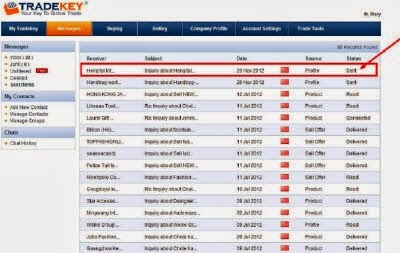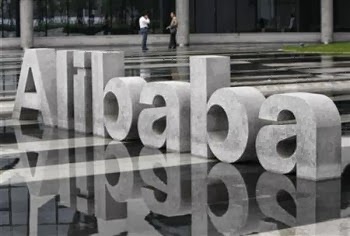TAOBAO MARKETPLACE has taken another step against counterfeit luxury goods by inking an agreement with Louis Vuitton to proactively remove intellectual property rights (IPR) infringing listings on it platform.
This is not the first time China's leading online e-tailer has collaborated with a luxury retailer as March last year they announced a similar deal,
Taobao Teams Up With Apple, Gucci To Remove Counterfeit Products.
Alibaba Group, China’s massive e-commerce firm, has announced a partnership with French high fashion label Louis Vuitton that aims to stop the sale of counterfeit luxury goods in China. The Alibaba-owned Taobao marketplace, China’s largest consumer-to-consumer online shopping outlet, is often flooded with knock-off designer goods in a country that largely turns a blind eye to their distribution. Alibaba, as a whole, handles more web transactions annually than both Amazon and eBay combined.
Louis Vuitton, owned by LVHM Moët Hennessy, is world-famous for its distinctive brown monogram leather merchandise. Due to both their popularity among celebrities and high price tags, the brand’s accessories are a prime target for counterfeiters. The brand have recently launched their upmarket line in order to distinguish themselves and reach a more elitist market.
Earlier this year, Chinese authorities in Guiyang broke up a high-profile counterfeit goods operation that was based in a high-end hotel. Police confiscated more than 6,000 fake items worth more than 81 million yuan ($13 million).
“The store owner admitted his bags cost around 100 to 200 yuan (US$16-$32) but that he sold them for over 1,000 yuan (US$160). The bags were of high quality and most of the buyers could not tell the difference from genuine items,” reported Want China Time. “Most of the goods were counterfeits of luxury brands Louis Vuitton and Gucci.”
Under the agreement with Louis Vuitton, Taobao Marketplace will proactively take down product listings of suspected counterfeit goods and implement preventive measures to stop sellers from listing fake items. These measures strengthen the current system in place whereby brand owners notify Taobao of intellectual property rights (IPR) infringing items and then Taobao acts to remove them from the giant online shopping website.
 |
| Alibaba Group online shopping site |
The agreement is part of ongoing efforts by Taobao Marketplace to work with brand owners to curtail fakes. In August, Alibaba Group signed an agreement with world’s largest anti-counterfeiting group, the International AntiCounterfeiting Coalition (IACC) to work together against pirated goods. The agreement called on IACC members, which include Apple and The Walt Disney Company, to assist Taobao in identifying copyright-infringing products listed on the site. Taobao Marketplace reached a similar agreement last September with the U.S.-based Motion Picture Association (MPA). The website is also working with Chinese government agencies and law enforcement to identify and shut down factories and other sources of counterfeit goods.
The agreement between Louis Vuitton and Taobao Marketplace will go toward building a fairer and more transparent online business environment, the companies said in a joint statement on Friday.
“Such collaboration is invaluable to us, in order to prevent the manufacture, transport and sales of counterfeit goods, online as well as off-line,” said Valérie Sonnier, Global Intellectual Property Director for Louis Vuitton.
Last August, Alibaba signed an agreement with the International Anti-Counterfeiting Coalition (IACC), proving that the e-commerce giant was serious about running a legitimate business.
In 2012, about $1.5 billion worth of counterfeit goods were stopped by European Union customs officials, according to an EU report. Fake watches, bags and clothing made up 46 percent of the value of the intercepted merchandise. China remains the top source for counterfeit items to the EU, said the report published in August.
Although China has taken steps to toughen its anti-piracy initiatives and laws in the face of mounting international criticism, experts say the enforcement of those laws have been mixed and the fluid nature of China’s labour economy means that when one factory closes another opens somewhere else.
Taobao Marketplace, which was removed from the United States Trade Representative list of “notorious markets” for piracy last year, was once a magnet for these counterfeit sellers eager to reach a bigger audience. Taobao’s efforts to clean up its platform has made it harder for counterfeiters to successfully list and sell items, say company officials.
"Taobao Marketplace is dedicated to the protection of intellectual property rights and the fight against counterfeiting, said Ni Liang, Senior Director of Internet Security, Alibaba Group. “We firmly believe that the collaboration between brands, platforms and government agencies will create visible and significant results in the intellectual property enforcement space.
“If Alibaba wants to remain the top dog in China's e-commerce, maintaining credibility with consumers is crucial,” said Duncan Clark, an investment advisory firm chairman who specialises in the Internet and e-commerce, in an interview with The Wall Street Journal.
Alibaba Group Vice President Brian Li added, “The Internet is not a place that generates piracy problems, but it’s a place that exposes them.”
✿ » For trusted authentic luxury products & services, visit
The UK's Most Trusted Online Reseller
If you enjoyed this post, please consider sharing it, leaving a comment or subscribing to the RSS feed to have future articles delivered to your feed reader.
RELATED ARTICLES
» Help Us Fight Fakes, Alibaba's Impassioned Plea to Global Brands
»
Luxury Group Kering sues Alibaba for helping Counterfeiters
»
Bank of China Complies With Subpoena In Gucci Counterfeit Case
»
Taobao Teams Up With Apple, Gucci To Remove Counterfeit Products
»
Louis Vuitton Files Suit in Connection with Counterfeit Goods on Alibaba











